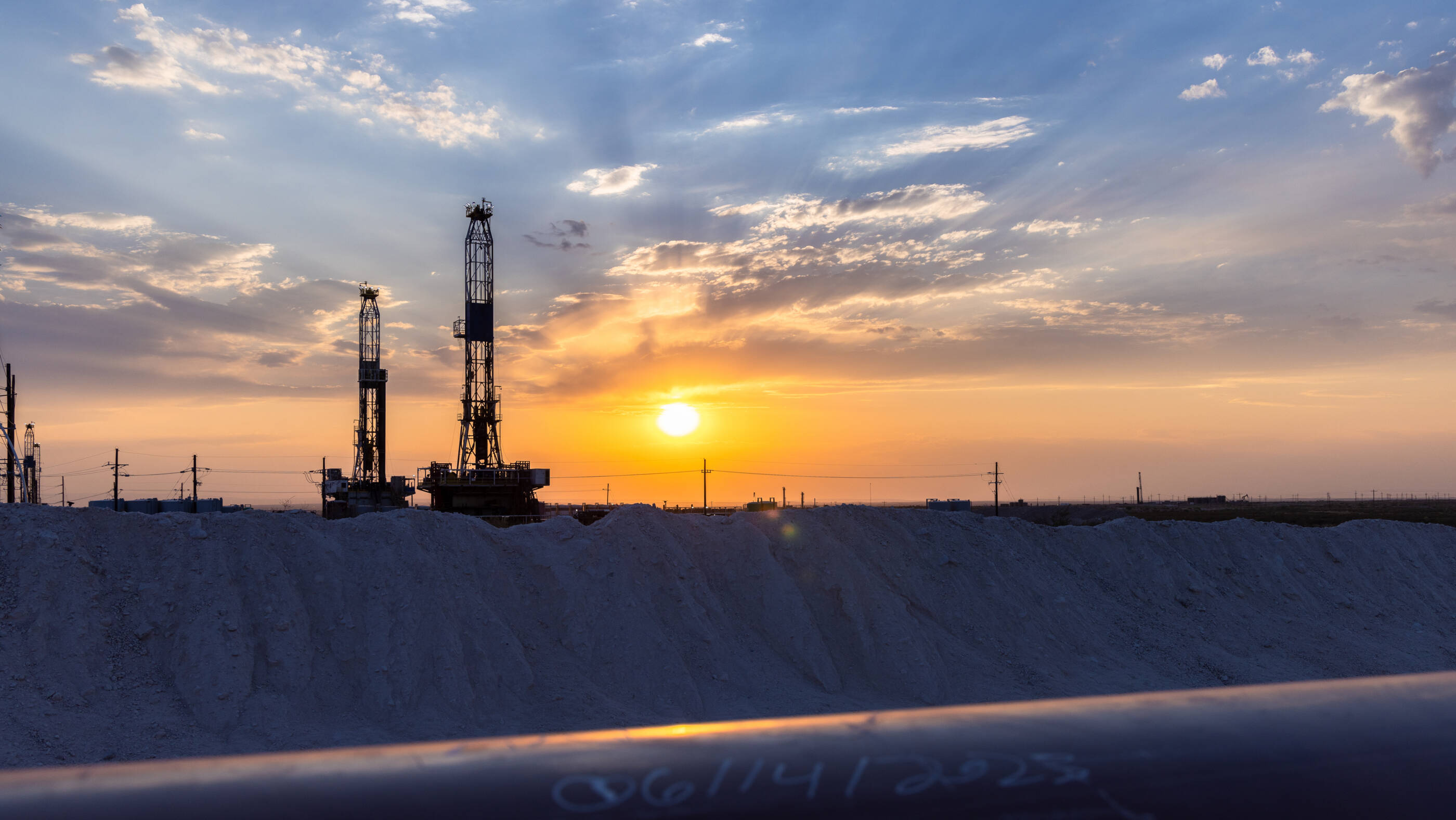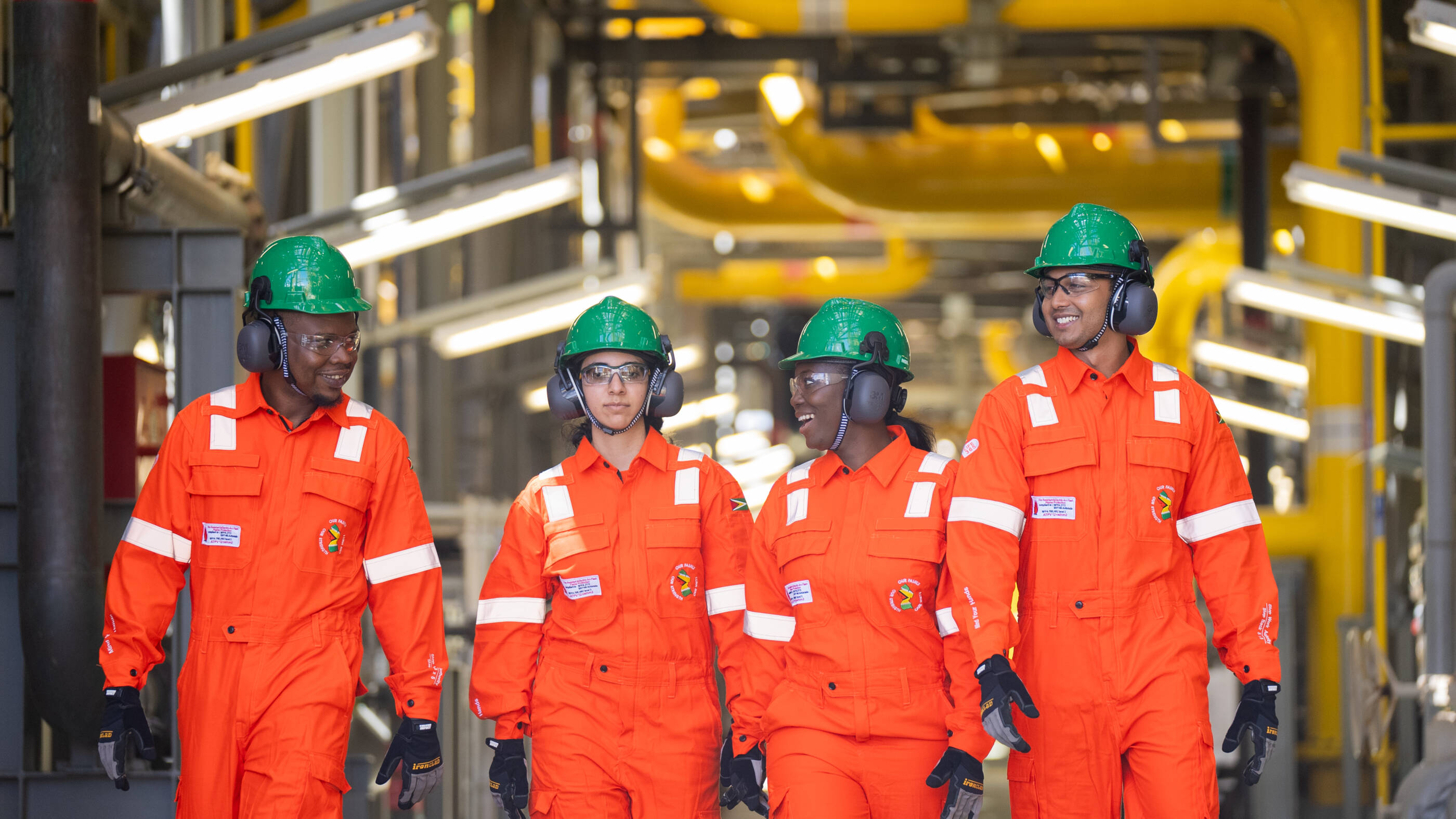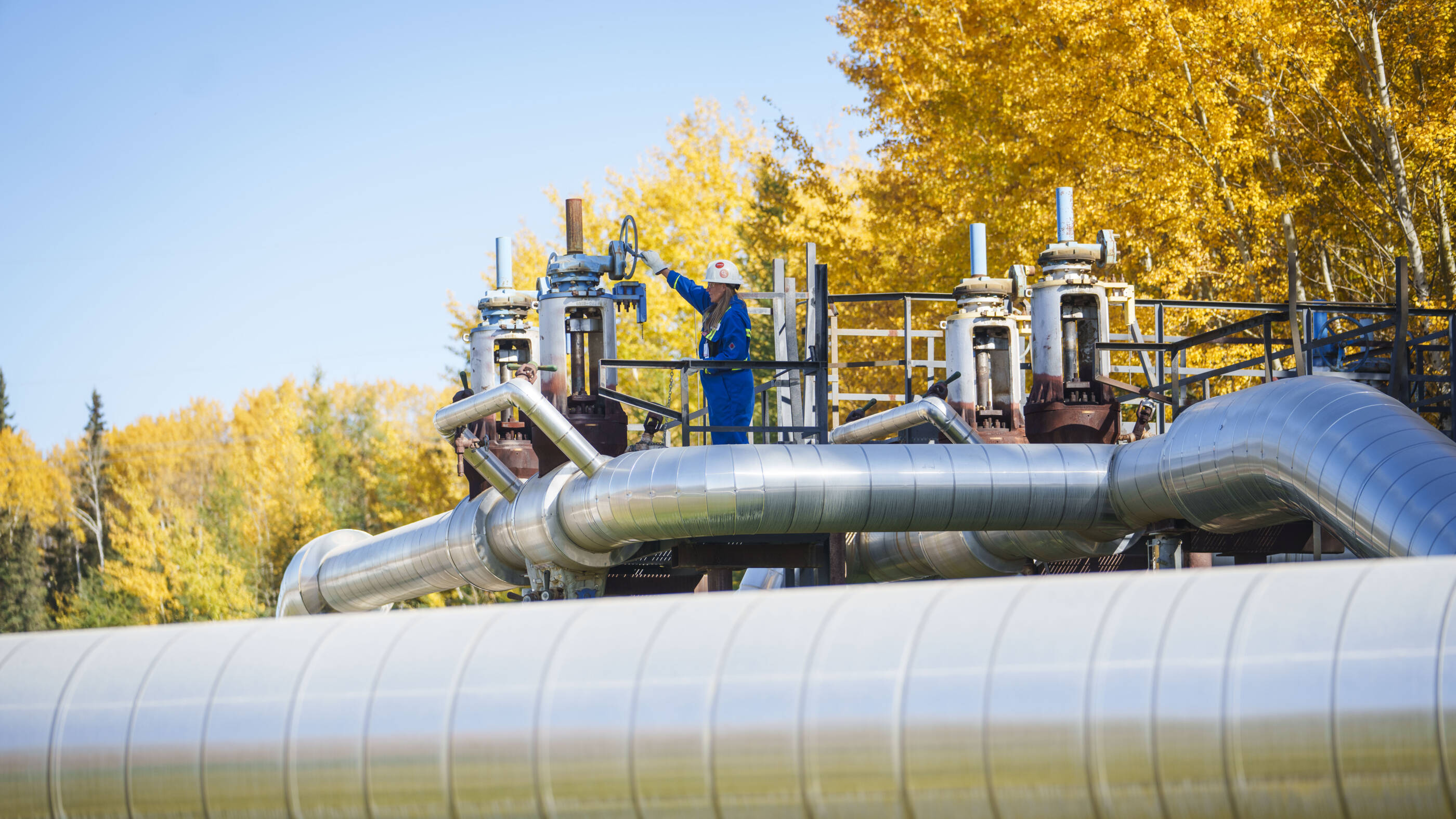4 min read
•Supporting a just transition
4 min read
•Navigate to:

Our company has been in a continuous state of evolution and transition since it was founded.
Having a workforce capable of developing and leading new businesses to meet society’s evolving needs is how we have prospered for more than 140 years.
Our approach
Where there is energy poverty, there is poverty. To be just, any approach to an energy transition must address society’s need for energy.
Guided by principles supporting a just transition, like those of Ipieca and the International Labour Organization, ExxonMobil aims to:
- Respect human rights in our operations.
- Create value for customers, partners, and communities.
- Provide employees with unrivaled opportunities for growth with impactful work.
- Manage environmental and socioeconomic impacts throughout asset lifecycles.
- Engage with employees and communities in efforts to improve quality of life and foster mutual understanding and trust.
Positioned to lead in an energy transition
Sustained emissions reductions require a thoughtful and comprehensive approach. One that:
- Balances benefits and costs.
- Is sensitive to society’s needs.
- Avoids economic hardship, market disruptions, and energy and product shortages.
Accomplishing this and moving society toward a net-zero future will require unprecedented collaboration at scale. As we work to Protect Tomorrow. Today., we consider the impact on workers, communities, supply chains, consumers, and broader economic development.
Our Global Outlook estimates that more than 4 billion people still lack access to reliable energy for housing, infrastructure, jobs, and mobility. Providing for these basic energy needs is a must to meet the United Nations’ goal to “end poverty in all its forms everywhere.” And as a society, it's our challenge to meet these needs while reducing emissions globally and managing the impacts of these actions on people.
Our culture of innovation and many decades of experience, enhanced through continuous training, are important competitive advantages. The integration of our business, and the flexibility it gives us to pursue new technologies and markets, is another.
In this regard, we have always been engaged in what is now referred to as a “just transition.” Our employees are well positioned to play meaningful roles in a traditional energy business that will be vital for decades to come AND play an equally important role in the lower carbon emissions portfolio we are hard at work building.
In many cases, the “transition” is minimal, such as moving from conventional fuels to biofuels. In others, we use our capabilities to innovate new processes, like drilling for lithium using our experience with oil or natural gas. In areas like carbon capture and storage, we are expanding efforts we’ve been working on for more than 40 years and supporting a larger workforce as this part of our business grows.
Our commitment to our employees and the communities in which we live and work has been on display since the 19th century – proving to our employees and their friends, families, and neighbors that we care about them, value the work they do, and are committed to developing them for the duration of their careers. At ExxonMobil, that is good business, and the just thing to do.
Applying our approach
Informed by relevant, globally recognized principles, such as those of the International Labour Organization, that support a “just transition,” we’re working to provide energy and products people need, lead in reducing our own and others’ greenhouse gas emissions, and deliver on our strategic objectives.
We operate facilities and market products across the globe. Our standards, systems, processes and programs help us to understand and manage risks and opportunities within the unique context of each location, from developing economies focused on energy security to communities with established workforces seeking new opportunities.
We invest in and support employees for the long-term. We also work to contribute to the progress and prosperity of our communities. Our work to build and maintain supply chains in the places we operate is one example. We regularly engage and collaborate with industry, communities, employees, educational institutions, governments, businesses, and NGOs to support these objectives.
In our Low Carbon Solutions business and across the company, we apply our integrated environmental and socioeconomic management approach. This supports our efforts to proactively identify and address potential socioeconomic risks and opportunities. We update our assessments and management plans as needed to reflect changes to our operations or characteristics of a community.
Our employees
Many of the capabilities and skills of today’s workforce are critical for an energy transition. In fact, our work to reduce emissions is largely grounded in the transferable skillsets already present in our traditional businesses.
“Meaningful development” is one of our five strategic priorities. We have a proven, long-term commitment to developing employees – our career-oriented as for our career employees. We are proud of this commitment and are determined to maintain it.
In 2022, we reorganized around three integrated core businesses: Upstream, Product Solutions, and Low Carbon Solutions. This structure provides employees with greater access to growth opportunities, broadening their experiences and capabilities for future roles.
Our Low Carbon Solutions business includes employees with decades of experience at our company or elsewhere in the oil and natural gas industry, as well as functional experts who bring outside-in thinking. New employees are offered onboarding and technical training, and leaders within the business line host regular sessions open to all employees designed to increase awareness of objectives and performance, provide expertise on variety of topics related to the business, and seek feedback from the broader workforce.
Our unique, career-oriented approach results in many employees moving to new roles about every three years. In 2024 around 12,000 employees took on new roles, gaining new skills and capabilities, often in different regions or parts of our business.
Our approach includes the ways we support employees when we acquire, divest or convert an asset, for any reason. Some recent examples:
- When we sold our refinery in Billings, Montana, all of the ~300 employees were offered jobs with the buyer.
- When the Altona refinery was converted to a fuel import and storage facility, employees were offered new roles or support services if exiting the company.
In 2024, our company-wide survey continued to demonstrate employee engagement and pride in being part of ExxonMobil, as well as employee understanding of our purpose and strategy, our progress in fostering a productive and inclusive environment, and our efforts to strengthen our culture. Additional information on our programs can be found in our annual Investing in People report.
SPOTLIGHT
Leveraging core capabilities for hydrogen
At our plant in Baytown, Texas, we’re investing in virtually carbon-free hydrogen (with approximately 98% of the carbon captured and stored).
Tina Joseph, Baytown Hydrogen Project Manager, is a chemical engineer with a wealth of experience in our upstream business. She leads a team developing the front-end engineering design and execution plans for the Baytown Hydrogen plant. Currently under design, the plant could produce up to 1 billion cubic feet of hydrogen per day.
“I am able to leverage my planning and projects skills from prior Upstream roles for this incredible project that will help deliver a low-carbon future. Working at ExxonMobil, I get to work with such high-caliber and driven people on a project of this scale.”
Our communities
We believe that respecting human rights, managing community impacts, and making valued social investments are essential to our business success.
Our operations have the potential to impact communities both positively and negatively. To address this, we regularly engage with a diverse range of stakeholders who are representative of the community to seek out opportunities and address their concerns.
We also identify and consult with potentially disadvantaged communities to understand possible barriers to their active engagement. We work to tailor our engagements to be locally and culturally appropriate, providing accessible and inclusive channels for communication.
Inclusive engagement helps us to be responsive to concerns and opportunities. Where appropriate, we integrate the results into our efforts. We conduct engagements like these throughout the life of our assets. This helps us avoid or reduce risks, enhance benefits, support investments, avoid delays, remedy impacts, and embrace opportunities at the local level.
Additional information can be found in the Managing socioeconomic impacts section of our Sustainability Report.
Our supply chain
We understand the importance of building and maintaining a qualified and competitive supply chain where we operate. As with our workforce, many of the goods and services essential for our business today are the same ones needed in the future.
As part of our supply chain portfolio, we purchase goods and services from local, small, and diverse suppliers and, where appropriate, work to build their capabilities through local programs to increase competition and innovation.
This approach helps to make a positive impact on communities by building long-term, local economic capacity in support of a just energy transition. It also contributes to the objectives of the U.N. Sustainable Development Goals.
Additional information can be found in the Contributing to the well-being of communities section of our Sustainability Report.
Industry collaboration
We have a long history of collaborating with universities, national laboratories, industries, and companies of all sizes around the world. We continuously seek new opportunities where each participant brings unique skills and capabilities to support the development of current and future workers and suppliers.
Many of our collaborations with universities and others are described in our Advancing Climate Solutions, Sustainability, and Investing in People reports. We also leverage the scale of our industry through participation in trade associations and by expanding high-quality collaborations with local community and technical colleges.
The American Petroleum Institute (API) is an example of an industry association investing in the future of energy by fostering a diverse, inclusive, and resilient workforce. API offers a broad range of training and certifications, and we consult on program designs and curriculum development in support of the current and the next generation of workers.
The Ipieca Just Transition Task Force participated in COP28, convening a discussion on “Business leadership on the Global Stocktake: catalysing investment while prioritising a just transition.” This work builds upon recent work like the task force’s just transition literature review and its statement on accelerating a just transition, which was developed in consultation with member companies and external industry stakeholders.
ExxonMobil chairs the Just Transition Task Force within Ipieca, which is “the global oil and natural gas association for advancing environmental and social performance across the energy transition.” The task force supports the industry’s participation in international collaboration to transition to a lower-carbon world in a way that’s just and fair for workforces, communities, and consumers.
-
Meeting society's critical needs for energy and products
Publications
Explore more

Expanding the plastics life cycle
3 min read
•
Integrating sustainability into what we do
5 min read
•
Working with suppliers

Enhancing process safety
3 min read
•
Improving air quality
2 min read
•FORWARD-LOOKING STATEMENT WARNING
Images or statements of future ambitions, aims, aspirations, plans, goals, events, projects, projections, opportunities, expectations, performance, or conditions in the publications, including plans to reduce, abate, avoid or enable avoidance of emissions or reduce emissions intensity, sensitivity analyses, expectations, estimates, the development of future technologies, business plans, and sustainability efforts are dependent on future market factors, such as customer demand, continued technological progress, stable policy support and timely rule-making or continuation of government incentives and funding, and represent forward-looking statements. Similarly, emission-reduction roadmaps to drive toward net zero and similar roadmaps for emerging technologies and markets, and water management roadmaps to reduce freshwater intake and/or manage disposal, are forward-looking statements. These statements are not guarantees of future corporate, market or industry performance or outcomes for ExxonMobil or society and are subject to numerous risks and uncertainties, many of which are beyond our control or are even unknown.
Actual future results, including the achievement of ambitions to reach Scope 1 and 2 net zero from operated assets by 2050, to reach Scope 1 and 2 net zero in heritage Permian Basin unconventional operated assets by 2030, and in Pioneer Permian assets by 2035, to eliminate routine flaring in-line with World Bank Zero Routine Flaring, to reach near zero methane emissions from operated assets and other methane initiatives to meet ExxonMobil’s greenhouse gas emission reduction plans and goals, divestment and start-up plans, and associated project plans as well as technology advances, including in the timing and outcome of projects to capture, transport and store CO2, produce hydrogen and ammonia, produce lower-emission fuels, produce ProxximaTM systems, produce carbon materials, produce lithium, and use plastic waste as feedstock for advanced recycling; future debt levels and credit ratings; business and project plans, timing, costs, capacities and profitability; resource recoveries and production rates; planned Denbury and Pioneer integrated benefits; obtain data on detection, measurement and quantification of emissions including reporting of that data or updates to previous estimates and progress in sustainability focus areas could vary depending on a number of factors, including global or regional changes in oil, gas, petrochemicals, or feedstock prices, differentials, seasonal fluctuations, or other market or economic conditions affecting the oil, gas, and petrochemical industries and the demand for our products; new market products and services; future cash flows; our ability to execute operational objectives on a timely and successful basis; the ability to realize efficiencies within and across our business lines; new or changing government policies for lower carbon and new market investment opportunities, or policies limiting the attractiveness of investments such as European taxes on energy and unequal support for different methods of carbon capture; developments or changes in local, national, or international treaties, laws, regulations, taxes, trade sanctions, trade tariffs, and incentives affecting our business, including those related to greenhouse gas emissions, plastics, carbon storage and carbon costs; timely granting of governmental permits and certifications; uncertain impacts of deregulation on the legal and regulatory environment; evolving reporting standards for these topics and evolving measurement standards for reported data; trade patterns and the development and enforcement of local, national and regional mandates; unforeseen technical or operational difficulties; the outcome of research efforts and future technology developments, including the ability to scale projects and technologies such as electrification of operations, advanced recycling, carbon capture and storage, hydrogen and ammonia production, ProxximaTM systems, carbon materials or direct lithium extraction on a commercially competitive basis; the development and competitiveness of alternative energy and emission reduction technologies; unforeseen technical or operating difficulties, including the need for unplanned maintenance; availability of feedstocks for lower-emission fuels, hydrogen, or advanced recycling; changes in the relative energy mix across activities and geographies; the actions of co-venturers competitors; changes in regional and global economic growth rates and consumer preferences including willingness and ability to pay for reduced emissions products; actions taken by governments and consumers resulting from a pandemic; changes in population growth, economic development or migration patterns; timely completion of construction projects; war, civil unrest, attacks against the Company or industry, and other political or security disturbances, including disruption of land or sea transportation routes; decoupling of economies, realignment of global trade and supply chain networks, and disruptions in military alliances; and other factors discussed here and in Item 1A. Risk Factors of our Annual Report on Form 10-K and under the heading “Factors affecting future results” available under the “Earnings” tab through the “Investors” page of our website at www.exxonmobil.com. The Advancing Climate Solutions Report includes 2024 greenhouse gas emissions performance data as of March 1, 2025, and Scope 3 Category 11 estimates for full year 2024 as of February 19, 2025. The greenhouse gas intensity and greenhouse gas emission estimates include Scope 2 market-based emissions. The Sustainability Report, the Advancing Climate Solutions Report, and corresponding Executive Summaries were issued on April 30, 2025. The content and data referenced in these publications focus primarily on our operations from Jan. 1, 2024 – Dec. 31, 2024, unless otherwise indicated. Tables on our “Metrics and data” page were updated to reflect full year 2024 data. Information regarding some known events or activities in 2025 and historical initiatives from prior years are also included. No party should place undue reliance on these forward-looking statements, which speak only as of the dates of these publications. All forward-looking statements are based on management’s knowledge and reasonable expectations at the time of publication. ExxonMobil assumes no duty to update these statements or materials as of any future date, and neither future distribution of this material nor the continued availability of this material in archive form on our website should be deemed to constitute an update or re-affirmation of these figures or statements as of any future date. Any future update will be provided only through a public disclosure indicating that fact.
See “ABOUT THE ADVANCING CLIMATE SOLUTIONS AND SUSTAINABILITY REPORTS” at the end of this document for additional information on these reports and the use of non-GAAP and other financial measures.
ABOUT THE ADVANCING CLIMATE SOLUTIONS AND SUSTAINABILITY REPORTS
The Advancing Climate Solutions Report contains terms used by the TCFD, as well as information about how the disclosures in this report are consistent with the recommendations of the TCFD. In doing so, ExxonMobil is not obligating itself to use any terms in the way defined by the TCFD or any other party, nor is it obligating itself to comply with any specific recommendation of the TCFD or to provide any specific disclosure. For example, with respect to the term “material,” individual companies are best suited to determine what information is material, under the long-standing U.S. Supreme Court definition, and whether to include this information in U.S. Securities and Exchange Act filings. In addition, the ISSB is evaluating standards that provide their interpretation of TCFD which may or may not be consistent with the current TCFD recommendations. The Sustainability Report and Advancing Climate Solutions Report are each a voluntary disclosure and are not designed to fulfill any U.S., foreign, or third-party required reporting framework.
Forward-looking and other statements regarding environmental and other sustainability efforts and aspirations are not intended to communicate any material investment information under the laws of the United States or represent that these are required disclosures. These publications are not intended to imply that ExxonMobil has access to any significant non-public insights on future events that the reader could not independently research. In addition, historical, current, and forward-looking environmental and other sustainability-related statements may be based on standards for measuring progress that are still developing, internal controls and processes that continue to evolve, and assumptions that are subject to change in the future, including future laws and rulemaking. Forward-looking and other statements regarding environmental and other sustainability efforts and aspirations are for informational purposes only and are not intended as an advertisement for ExxonMobil’s equity, debt, businesses, products, or services and the reader is specifically notified that any investor-requested disclosure or future required disclosure is not and should not be construed as an inducement for the reader to purchase any product or services. The statements and analysis in these publications represent a good faith effort by the Company to address these investor requests despite significant unknown variables and, at times, inconsistent market data, government policy signals, and calculation, methodologies, or reporting standards.
Actions needed to advance ExxonMobil’s 2030 greenhouse gas emission-reductions plans are incorporated into its medium-term business plans, which are updated annually. The reference case for planning beyond 2030 is based on the Company’s Global Outlook research and publication. The Global Outlook is reflective of the existing global policy environment and an assumption of increasing policy stringency and technology improvement to 2050. However, the Global Outlook does not attempt to project the degree of required future policy and technology advancement and deployment for the world, or ExxonMobil, to meet net zero by 2050. As future policies and technology advancements emerge, they will be incorporated into the GIobal Outlook, and the Company’s business plans will be updated as appropriate. References to projects or opportunities may not reflect investment decisions made by the corporation or its affiliates. Individual projects or opportunities may advance based on a number of factors, including availability of stable and supportive policy, permitting, technological advancement for cost-effective abatement, insights from the Company planning process, and alignment with our partners and other stakeholders. Capital investment guidance in lower-emission and other new investments is based on our corporate plan; however, actual investment levels will be subject to the availability of the opportunity set, stable public policy support, other factors, and focused on returns.
Energy demand modeling aims to replicate system dynamics of the global energy system, requiring simplifications. The reference to any scenario or any pathway for an energy transition, including any potential net-zero scenario, does not imply ExxonMobil views any particular scenario as likely to occur. In addition, energy demand scenarios require assumptions on a variety of parameters. As such, the outcome of any given scenario using an energy demand model comes with a high degree of uncertainty. For example, the IEA describes its NZE scenario as extremely challenging, requiring unprecedented innovation, unprecedented international cooperation, and sustained support and participation from consumers, with steeper reductions required each year since the scenario’s initial release. Third-party scenarios discussed in these reports reflect the modeling assumptions and outputs of their respective authors, not ExxonMobil, and their use or inclusion herein is not an endorsement by ExxonMobil of their underlying assumptions, likelihood, or probability. Investment decisions are made on the basis of ExxonMobil’s separate planning process but may be secondarily tested for robustness or resiliency against different assumptions, including against various scenarios. These reports contain information from third parties. ExxonMobil makes no representation or warranty as to the third-party information. Where necessary, ExxonMobil received permission to cite third-party sources, but the information and data remain under the control and direction of the third parties. ExxonMobil has also provided links in this report to third-party websites for ease of reference. ExxonMobil’s use of the third-party content is not an endorsement or adoption of such information.
ExxonMobil reported emissions, including reductions and avoidance performance data, are based on a combination of measured and estimated data. We assess our performance to support continuous improvement throughout the organization using our Environmental Performance Indicator (EPI) manual. The reporting guidelines and indicators in the Ipieca, the American Petroleum Institute (API), the International Association of Oil and Gas Producers Sustainability Reporting Guidance for the Oil and Gas Industry (4th edition, 2020, revised February 2023) and key chapters of the GHG Protocol inform the EPI and the selection of the data reported. Emissions reported are estimates only, and performance data depends on variations in processes and operations, the availability of sufficient data, the quality of those data and methodology used for measurement and estimation. Emissions data is subject to change as methods, data quality, and technology improvements occur, and changes to performance data may be updated. Emissions, reductions, abatements and enabled avoidance estimates for non-ExxonMobil operated facilities are included in the equity data and similarly may be updated as changes in the performance data are reported. ExxonMobil’s plans to reduce emissions are good-faith efforts based on current relevant data and methodology, which could be changed or refined. ExxonMobil works to continuously improve its approach to estimate, detect, measure, and address emissions. ExxonMobil actively engages with industry, including API and Ipieca, to improve emission factors and methodologies, including measurements and estimates.
Any reference to ExxonMobil’s support of, work with, or collaboration with a third-party organization within these publications do not constitute or imply an endorsement by ExxonMobil of any or all of the positions or activities of such organization. ExxonMobil participates, along with other companies, institutes, universities and other organizations, in various initiatives, campaigns, projects, groups, trade organizations, and other collaborations among industry and through organizations like the United Nations that express various ambitions, aspirations and goals related to climate change, emissions, sustainability, and the energy transition. ExxonMobil’s participation or membership in such collaborations is not a promise or guarantee that ExxonMobil’s individual ambitions, future performance or policies will align with the collective ambitions of the organizations or the individual ambitions of other participants, all of which are subject to a variety of uncertainties and other factors, many of which may be beyond ExxonMobil’s control, including government regulation, availability and cost-effectiveness of technologies, and market forces and other risks and uncertainties. Such third parties’ statements of collaborative or individual ambitions and goals frequently diverge from ExxonMobil’s own ambitions, plans, goals, and commitments. ExxonMobil will continue to make independent decisions regarding the operation of its business, including its climate-related and sustainability-related ambitions, plans, goals, commitments, and investments. ExxonMobil’s future ambitions, goals and commitments reflect ExxonMobil’s current plans, and ExxonMobil may unilaterally change them for various reasons, including adoption of new reporting standards or practices, market conditions; changes in its portfolio; and financial, operational, regulatory, reputational, legal and other factors.
References to “resources,” “resource base,” “recoverable resources” and similar terms refer to the total remaining estimated quantities of oil and natural gas that are expected to be ultimately recoverable. The resource base includes quantities of oil and natural gas classified as proved reserves, as well as quantities that are not yet classified as proved reserves, but that are expected to be ultimately recoverable. The term “resource base” is not intended to correspond to SEC definitions such as “probable” or “possible” reserves. For additional information, see the “Frequently Used Terms” on the Investors page of the Company’s website at www.exxonmobil.com under the header “Modeling Toolkit.” References to “oil” and “gas” include crude, natural gas liquids, bitumen, synthetic oil, and natural gas. The term “project” as used in these publications can refer to a variety of different activities and does not necessarily have the same meaning as in any government payment transparency reports.
Exxon Mobil Corporation has numerous affiliates, many with names that include ExxonMobil, Exxon, Mobil, Esso, and XTO. For convenience and simplicity, those terms and terms such as “Corporation,” “company,” “our,” “we,” and “its” are sometimes used as abbreviated references to one or more specific affiliates or affiliate groups. Abbreviated references describing global or regional operational organizations, and global or regional business lines are also sometimes used for convenience and simplicity. Nothing contained herein is intended to override the corporate separateness of affiliated companies. Exxon Mobil Corporation’s goals do not guarantee any action or future performance by its affiliates or Exxon Mobil Corporation’s responsibility for those affiliates’ actions and future performance, each affiliate of which manages its own affairs. For convenience and simplicity, words like venture, joint venture, partnership, co-venturer and partner are used to indicate business relationships involving common activities and interests, and those words may not indicate precise legal relationships. These publications cover Exxon Mobil Corporation’s owned and operated businesses and do not address the performance or operations of our suppliers, contractors or partners unless otherwise noted. In the case of certain joint ventures for which ExxonMobil is the operator, we often exercise influence but not control. Thus, the governance, processes, management and strategy of these joint ventures may differ from those in these reports. At the time of publication, ExxonMobil has completed the acquisitions of Denbury Inc. and Pioneer Natural Resources Company. These reports and the data therein do not speak of these companies’ pre-acquisition governance, risk management, strategy approaches, or emissions or sustainability performance unless specifically referenced.
These reports or any material therein are not to be used or reproduced without the permission of Exxon Mobil Corporation. All rights reserved.
SUPPLEMENTAL INFORMATION FOR NON-GAAP AND OTHER MEASURES
The Positioned for Growth in a Lower-Emission Future section of the Advancing Climate Solutions Report mentions modeled operating cash flow in comparing different businesses over time in a future scenario. Historic operating cash flow is defined as net income, plus depreciation, depletion and amortization for consolidated and equity companies, plus noncash adjustments related to asset retirement obligations plus proceeds from asset sales. The Company’s long-term portfolio modeling estimates operating cash flow as revenue or margins less cash expenses, taxes and abandonment expenditures plus proceeds from asset sales before portfolio capital expenditures. The Company believes this measure can be helpful in assessing the resiliency of the business to generate cash from different potential future markets. The performance data presented in the Advancing Climate Solutions Report and Sustainability Report, including on emissions, is not financial data and is not GAAP data.



